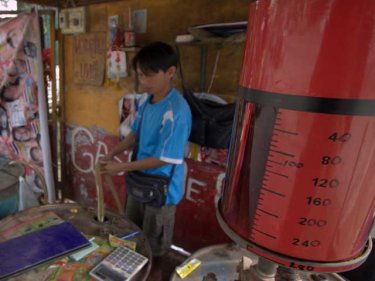PHUKET's inflation rate is running at 11.5 percent, considerably higher than the Thailand national rate of 9.2 percent, the Ministry of Commerce told Phuketwan today.
The ministry's local director, Tanyatorn Autokasaynee, says the island's inflation rate is higher because everything, including fresh food produce, has to be imported.
And the good news, at least for people on Phuket: prices are rising even higher and faster in neighboring Phang Nga, Trang and other southern provinces.
The reason, says Khun Tanyatorn: lack of the kind of competition among big retail stores that Phuket has in abundance these days.
The big bogey remains fuel prices, even though the cost of petrol has fallen lately.
The drop in cost has yet to affect manufacturing, so it will be a while before any savings are passed on to consumers.
''Usually the big retailers start to sell old stock at the end of the year. That should help to produce a reduction in prices between now and December,'' Khun Tanyatorn said.
Choice was Phuket's big advantage, she said, with island residents able to shop around and compare prices, unlike provinces where the larger retailers have yet to make their mark.
Phuketwan had noted that the price of spicy papaya somtam salad seemed to be on the rise. But Khun Tanyatorn said it was simply a matter of market values and location.
The same dish that cost 25 baht from a street stall could cost 200 baht in a swanky air-conditioned restaurant, she said.
Food and beverage items rose 0.2 percent in July but fresh oranges, pineapples and mangoes shot up by 6.2 percent.
''If the cost of petrol drops, products should be cheaper in shops before too much longer,'' she said.
The ministry checks 250 items each month to assess the island's inflation rate and welcomes feedback from the public.
Regular prices for goods on Phuket can be viewed online in English as well as Thai at www.price.moc.go.th
People who suspect retailers of charging excessive prices for essential items should call the ministry on 076 212017.
Come to Phuketwan on Friday for all-day updates on the vital meeting between marine biologists, divers and fishing groups that will decide the future for many of the region's endangered coral reefs
The ministry's local director, Tanyatorn Autokasaynee, says the island's inflation rate is higher because everything, including fresh food produce, has to be imported.
And the good news, at least for people on Phuket: prices are rising even higher and faster in neighboring Phang Nga, Trang and other southern provinces.
The reason, says Khun Tanyatorn: lack of the kind of competition among big retail stores that Phuket has in abundance these days.
The big bogey remains fuel prices, even though the cost of petrol has fallen lately.
The drop in cost has yet to affect manufacturing, so it will be a while before any savings are passed on to consumers.
''Usually the big retailers start to sell old stock at the end of the year. That should help to produce a reduction in prices between now and December,'' Khun Tanyatorn said.
Choice was Phuket's big advantage, she said, with island residents able to shop around and compare prices, unlike provinces where the larger retailers have yet to make their mark.
Phuketwan had noted that the price of spicy papaya somtam salad seemed to be on the rise. But Khun Tanyatorn said it was simply a matter of market values and location.
The same dish that cost 25 baht from a street stall could cost 200 baht in a swanky air-conditioned restaurant, she said.
Food and beverage items rose 0.2 percent in July but fresh oranges, pineapples and mangoes shot up by 6.2 percent.
''If the cost of petrol drops, products should be cheaper in shops before too much longer,'' she said.
The ministry checks 250 items each month to assess the island's inflation rate and welcomes feedback from the public.
Regular prices for goods on Phuket can be viewed online in English as well as Thai at www.price.moc.go.th
People who suspect retailers of charging excessive prices for essential items should call the ministry on 076 212017.
Come to Phuketwan on Friday for all-day updates on the vital meeting between marine biologists, divers and fishing groups that will decide the future for many of the region's endangered coral reefs




